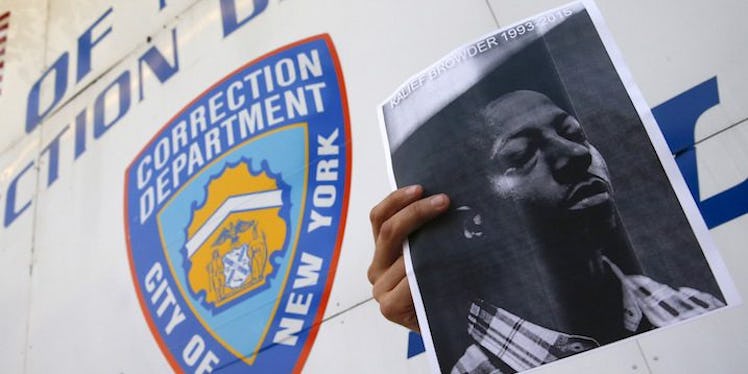
Locking Up Teens With Adults Is Cruel And Unusual, But It Still Happens Here
Jumping turnstiles, stealing cellphones and getting in fights -- these are just some of the misdemeanors teenagers are put in jail for in New York and North Carolina, alongside much older, violent offenders.
Young people in these states are thrown into adults prisons before they are eligible to vote or can legally buy cigarettes, and experts agree it has a reverberating and detrimental impact on their lives and communities.
In recent months, policy-makers, activists, social justice organizations, re-entry organizations and incarcerated people themselves have come together to support the Raise the Age campaign, which calls for the state of New York to stop trying 16-and 17-year-olds as adults and treat them as juveniles.
The fate of this proposal depends on New York state lawmakers, who have a deadline of April 1 to decide on the state budget.
New York should be ashamed to be one of two states in the nation that treat 16 and 17 year olds as adults.
Raising the age of criminal liability will require more funding for family court and the creation of youth courts, among other things.
Governor Andrew Cuomo and a majority of New Yorkers -- 59 percent, according to a recent poll -- support Raise the Age legislation. But, Republicans in the New York state senate, as well as a small group of Democrats, have stalled any reform.
In defense of their stance, these lawmakers have cited financial concerns, while also contending teens who commit violent crimes should continue to be tried as adults.
The Long-Term Impact Of Serving Time
Geoffrey Golia, a social worker with the organization Getting Out and Staying Out (GOSO), a comprehensive program that serves 16-to 24-year-old young men who've been involved in the criminal justice system, sees the daily consequences prison time has on teens.
Golia believes it's counterintuitive to think that sending young people to a place like Rikers Island will actually teach them anything but violence,
It's clear to anyone that's been to Rikers Island that it's a physically and psychologically demeaning place. Folks are kept in cages. There are slashings, beatings, stabbings -- all the time. How is a 16-year-old supposed to cope and heal from that?
One of the saddest and most infuriating cases that's often cited in relation to the Raise the Age campaign is that of Kalief Browder.
Browder was arrested at 16 in the Bronx for a crime he didn't commit -- stealing a backpack.
Subsequently, due to the inefficiency of New York City's courts, he was imprisoned on Rikers Island for three years.
For almost two of those years, he was subjected to the torturous isolation of solitary confinement. Browder also experienced frequent beatings from fellow inmates and prison guards.
Browder, who maintained his innocence throughout this ordeal, was eventually released after his case was dropped. He was never convicted of a crime.
READ MORE: How US Prisons Aren't Rehabilitating People, They're Torturing Them
The horrors he experienced on Rikers Island left him anxious, depressed and paranoid—something Golia says he sees all too often in his GOSO clients.
Ultimately, Browder took his own life.
This is precisely why people are fighting to raise the age, and why people like Golia argue that locking up teens is a form of cruel and unusual punishment.
"I do feel it's a form of cruel and unusual punishment to incarcerate young people as adults," said Golia. "While I'm not lawyer, from my experiences working on Rikers Island and counseling young men who served time there, it's clear to me we need to seriously look into alternatives to incarceration."
Race, Rehabilitation, and Alternatives to Incarceration
There's an undeniable link between race in the United States and our criminal justice system -- 80 percent of 16-and 17-year-olds who face incarceration are black or Latino.
And, with researching showing that teens who are sent into the adult criminal system emerge more violent and with severely less opportunities than those who go through the juvenile system, it's no surprise that, according to a study by the United States Sentencing Commission, 67.7 percent of offenders under the age of 21 are likely to wind up back behind bars.
This isn't the case for young men who participate in GOSO, however. Only 12 percent of their clients ever return to jail.
GOSO helps these young men with education, employment and improving metal health, with the ultimate goal of having them reach financial independence and emotional well-being, explains Golia.
We use a holistic approach to meet guys where they're at, and we provide them resources so they can get jobs and be successful individuals. Obviously, a lot of what we do is helping our guys stay out of and not return to jail.
In Golia's view, those who believe teenagers should continue to be tried as adults haven't fully thought through the impact spending time in jail has not just on individuals, but on the impact their time spent away has on their communities and their families.
"We have to look at the circumstances behind violent incidents," said Golia. "It's only when we understand the full context of a teenager's story that we can determine how to compassionately intervene and prevent this from happening again."
What the #RaiseTheAge campaign comes down to is questioning whether the current system actually helps rehabilitate young people.
If we truly want to address the systemic racism that pervades America and end the vicious cycle that perpetuates mass incarceration in the US, raising the age of criminal liability in New York and North Carolina would be a strong step forward.